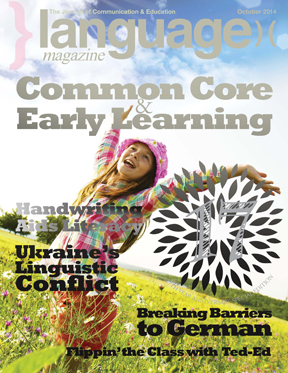Catching the Global Competence Bug
There’s a new catchphrase in education — “global competence.” Over the last few years, the phrase has spread from the corporate sector to mainstream education, and now the American Council on the Teaching of Foreign Languages (ACTFL) has published a position statement on it (see News, page 11). But what is global competence, why is it important, and how can we all benefit from it?
Global competence refers to the acquisition of in-depth knowledge and understanding of international issues, an appreciation of and ability to learn and work with people from diverse linguistic and cultural backgrounds, proficiency in more than one language, and skills to function productively in an interdependent world community — a clearer version of the “higher-order thinking skills” to which the Common Core State Standards often refer.
These skills and knowledge are becoming increasingly valuable as accelerated communications make the world a smaller place. Wider access to technology and cheaper travel are fueling globalization, which is leading to a more homogenous world society; however, at the same time, our natural need for self-identification persists, so we will continue to retain specific cultures, customs, beliefs, and languages for the foreseeable future. And, those people who can interact across cultures with sensitivity will be more successful in all their endeavors.
Globally competent employees recognize the importance of international trade to their local economy, understand the multicultural (even if not multinational) environment of successful corporations, and possess intercultural and language skills. While each industry and operational scale will have unique requirements, business leaders at all levels are already facing a growing need for talented team members who can bring a broad worldview to the workplace. The ability to operate in different languages, thrive in diverse environments, embrace change, and adapt to different ways of doing things is already highly valued, even at strictly domestic companies.
So what can we do to develop these skills in today’s students?
English language learners (ELLs) may actually start with an advantage when it comes to the acquisition of global competence, but all too often the desire to assimilate is so great that ties to other cultures are shunned. So, ELLs should be encouraged to retain and improve their heritage languages, learn more about their parental cultures, and be proud of their multiculturalism, while acquiring English language and American culture.
Bilingual, dual-language, and world-language programs from early childhood will obviously help to develop global competence, but international awareness, appreciation of cultural diversity, and the ability to source information must all come into the mix.
Ideally, as travel costs continue to fall, study/work abroad experiences will become commonplace so more students can benefit from full cultural and linguistic immersion. But all students should take advantage of the opportunity afforded them from living in a nation of immigrants, discover the diversity in their backyards, and learn more about the world from their next-door neighbors.
IN THIS ISSUE:
Cutting to the Common Core
What Does CCSS Mean for Early Learning?
Benjamin Heuston explains why a publisher has adapted its early learning materials to complement the new standards
Cutting to the Common Core
Sticking to the Script
Timothy Shanahan reassesses the role of handwriting in literacy development
Lessons from the Ukrainian Conflict
Angelika Putintseva’s firsthand experience leads her to believe that language intolerance is the root cause of conflict on the shores of the Black Sea
Breaking Barriers to German
Alexander Voll celebrates the 25th anniversary of the fall of the Berlin Wall
Customizing Videos for School
Claire Miller explains how TED-Ed enables teachers to turn almost any video into an engaging learning experience
Last Writes Richard Lederer has a ball with monsters of all kinds



